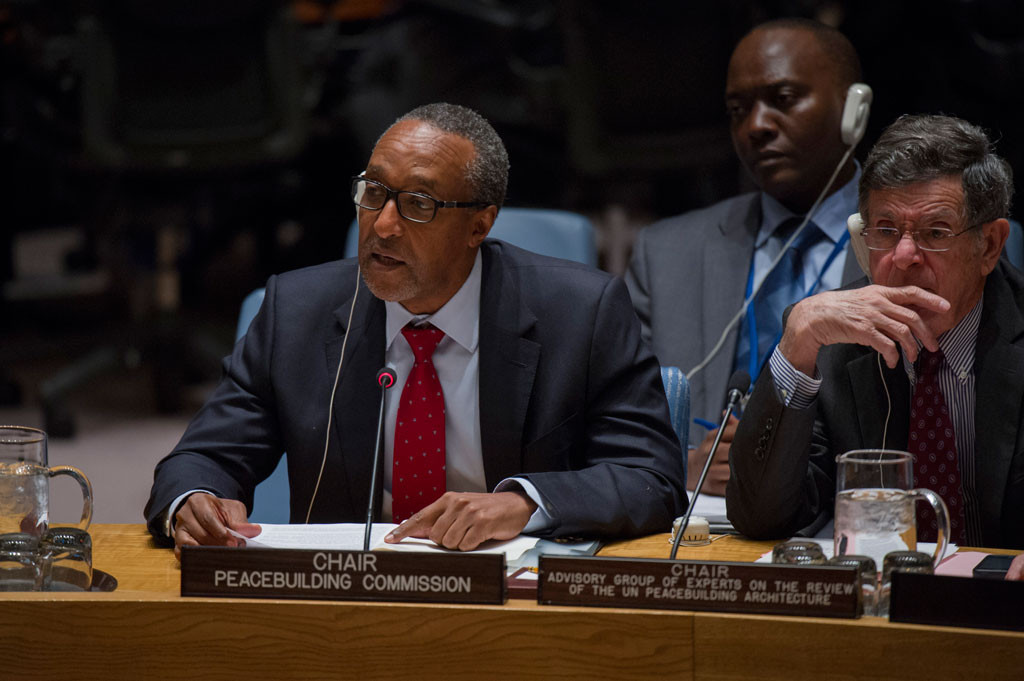
24 Feb, 2016
Prevention better than cure: UN peacebuilding body cites need to address root causes of conflict for sustainable peace
New York, USA, 23 February 2016, (UN News Centre) – The head of the United Nations advisory body tasked with making recommendations on post-conflict recovery, reconstruction and development stressed today that building lasting peace requires predictable, sustained and adequate efforts and financing to help stop violence and address the root causes of conflict.
Speaking today in an open debate of the Security Council on ‘Post-Conflict Peacebuilding: review of the peacebuilding architecture’ at UN Headquarters in New York, Macharia Kamau, chairman of the UN Peacebuilding Commission (PBC) and Permanent Representative of Kenya to the United Nations, underscored that investments in the prevention of outbreak, escalation, continuation and recurrence of conflict are considerably less expensive and sustainable than merely reacting to crises.
 Chair of the Peacebuilding Commission Macharia Kamau addresses the Security Council debate on “Post-conflict peacebuilding: review of the peacebuilding architecture.” UN Photo/Rick Bajornas |
“The Peacebuilding Commission, in its advisory role to the Council, stands ready to serve as a bridge between Security Council and other principal intergovernmental organs, with a view to strengthen the collaboration and enhance the impact of their collective work of peacebuilding in the world,” he said.
Noting that the role of the Peacebuilding Fund in providing financing to countries on their request has evidently been important, but remains limited in its impact, Mr. Kamau stressed that the Fund clearly needs to be enhanced.
Calling on UN Member States, including non-traditional donors and other partners, to consider making or increasing their multi-year commitments to pooled funds, in support of sustainable peace, Mr. Kamau said all financing-related proposals, including those aimed at appropriately resourcing peacebuilding programmes during transitions, need to be comprehensively considered by Member States during the current review.
“We need to address the predictability and sustainability of financing,” he said. “We must consider all the viable options available to maximize the potential and the predictability of the Peacebuilding Fund,” he added.
Also speaking at today’s debate was Olof Skoog, Permanent Representative of Sweden to the United Nations and former chair of the Peacebuilding Commission, who emphasized that peacebuilding can no longer be confined to post-conflict recovery.
“Sustaining peace encompasses the activities aimed at preventing the outburst, resurgence and continuation of conflict,” he said.
The single-most important outcome of the peacebuilding review process should endorse a corresponding change in the way the UN system is set up to respond to conflict, Mr. Skoog said.
“The Commission is quite a unique structure at the UN, and also a flexible body. I believe there are inherent opportunities for the Commission to keep evolving and to adopt new approaches, and thereby come closer to fulfilling its original vision of bridging the gap between crisis response and long-term development and sustainable peace,” he emphasized.
If the UN is serious about sustaining peace, Mr. Skoog continued, it has to ensure that there are resources to back up priorities.
“Very simply put, we need to walk the talk,” he said. “It is a tragic irony that while resources available for peacekeeping and humanitarian response amount to billions of dollars, conflict prevention initiatives – which could save so many lives and significantly lessen the need for peacekeeping in the first place – has to scramble for a fraction of those amounts.”
In addition, Mr. Skoog stressed that it is also necessary to create stronger partnerships with regional actors, and strengthen their capacity, since they are often first responders to conflict. By partnering with regional and sub-regional organizations, the UN response will be better informed by local perspectives and able to bring such understandings and approaches to peacebuilding to the fore.
Along those lines, Gert Rosenthal, chair of the advisory group of experts on the review of the UN peacebuilding architecture, stressed that it is necessary to rethink what is meant by “peacebuilding.” In fact, he said, the term is always preceded by the adjective “post conflict” on the agenda item of the Council.
Proposing the term “sustainable peace” as preferable and as the needed evolution in mindset, Mr. Rosenthal stressed that the UN as a whole must put a much greater accent on preventive measures.
“In fact, much of the present peacebuilding efforts do aim to address root causes, in the broader context of pre-empting lapse or relapse into violent conflict,” he noted. But, he added, “the determination in 2005 was to ensure that such efforts become central, but we found that regrettably this has not been the case.”
The Peacebuilding Commission is an intergovernmental body that was established in December 2005 by the UN General Assembly and Security Council.



Liked this article? Share it!